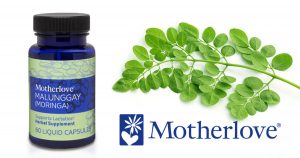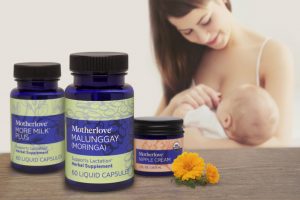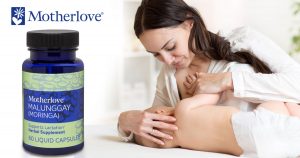Our sponsor this month is Motherlove Herbal Company. Motherlove is excited to acquaint you with their newest supplement for supporting breast milk supply, Malunggay (Moringa).
Malunggay (Moringa) – The New Super Galactagogue Food
In parts of the world where extra food or vitamins are not readily available, malunggay – also known as moringa, moringa oleifera, or nature’s “miracle tree” – has traditionally been used to supplement the necessary minerals (iron, calcium, potassium, zinc), vitamins (A, C, E, and the B complex), and protein in pregnant and breastfeeding mothers.
Now infants can get
all their vitamin D
from their mothers’ milk;
no drops needed with
our sponsor's
TheraNatal Lactation Complete
by THERALOGIX. Use PRC code “KELLY” for a special discount!
Motherlove’s Malunggay (Moringa) is now available as a liquid herbal extract or liquid vegetarian capsule to support breastfeeding mothers everywhere.

Malunggay (moringa) is a fast-growing, drought-resistant tree native to the southern foothills of the Himalayas in northwestern India, and widely cultivated in tropical and subtropical areas all over the world where its young seed pods and leaves are used as vegetables. Malunggay is a deciduous tree with whitish-grey bark and purplish or greenish shoots. It has fragrant pale yellow flowers and low hanging brown pods.
This unassuming tree is s urprisingly packed with 90+ vitamins, minerals, vital proteins and amino acids, antioxidants, and omega oils, and is often used to combat malnutrition, especially among infants and nursing mothers. The pods of the malunggay tree resemble green beans and are often cooked whole. Sometimes the pea-like seeds are removed from the pods and roasted. The leaves are consumed dried or like a salad leaf. It is one of nature’s most versatile and beneficial plants – delivering anti-inflammatory support, promoting healthy digestion, increasing energy, and helping to maintain healthy blood sugar levels and circulation. It has also been used to reduce swelling and as an antibacterial agent.* And, specific to breastfeeding, women have used it for generations to support healthy lactation.
urprisingly packed with 90+ vitamins, minerals, vital proteins and amino acids, antioxidants, and omega oils, and is often used to combat malnutrition, especially among infants and nursing mothers. The pods of the malunggay tree resemble green beans and are often cooked whole. Sometimes the pea-like seeds are removed from the pods and roasted. The leaves are consumed dried or like a salad leaf. It is one of nature’s most versatile and beneficial plants – delivering anti-inflammatory support, promoting healthy digestion, increasing energy, and helping to maintain healthy blood sugar levels and circulation. It has also been used to reduce swelling and as an antibacterial agent.* And, specific to breastfeeding, women have used it for generations to support healthy lactation.
As malunggay is comparable to other dark leafy greens, its incorporation into a mother’s diet is safe for both her and her child. Evidence shows that malunggay can act as a galactagogue, a natural substance that increases milk production, even among mothers who give birth to preterm infants.1 And in the Philippines, a study found that among mothers who breastfed and used malunggay daily, breast milk volume and infant weight gains were significantly greater than the control group of mothers and infants that were not exposed to the plant.2 In addition, a Senegalese study noted that postpartum use of malunggay increased maternal vitamin A intake and also increased the vitamin A content of breast milk for at least six months.3
Quantitatively, malunggay (moringa) provides more micro and macronutrients per gram of plant material than many other plant species. Gram for gram, malunggay leaves (fresh and dried) contain4:
● 17x the calcium of milk
● 15x the potassium of bananas
● 9x the protein of yogurt
● 10x the vitamin A of carrots
● 7x the vitamin C of oranges
● 25x the iron found in spinach
Malunggay’s galactagogue capabilities and multivitamin components are indisputable.5 But finding fresh or even powdered forms of it here in the United States is not often easy. In addition, when it comes to taking herbal supplements, taking a liquid form of a plant, versus a dried powdered form, delivers more potent properties and is more readily absorbed into the blood stream. Motherlove’s Malunggay (Moringa) in liquid herbal extract or liquid vegetarian capsule form makes it easy for busy breastfeeding mothers to find and take advantage of the benefits of malunggay.
As more IBCLCs learn about malunggay’s galactagogue properties, they are turning to Motherlove’s new single herb Malunggay (Moringa) supplement. Made from organic malunggay, it can safely be taken on its own or as a complement to Motherlove’s other popular lactation support blends such as More Milk Plus and More Milk Special Blend.
* These statements have not been evaluated by the FDA.
Resources:
1. Estrella, M.D., Ma. Corazon P., et al. “A double-blind, randomized controlled trial on the use of malunggay (Moringa oleifera) for augmentation of the volume of breastmilk among non-nursing mothers of preterm infants.” The Philippine Journal of Pediatrics, vol. 49, no. 1, Jan-March 2000. And, Espinosa-Kuo, MD, Criselda L. “A Randomized Controlled Trial on the Use of Malunggay (Moringa oleifera) for Augmentation of the Volume of Breastmilk Among Mothers of Term Infants.” The Filipino Family Physician, vol. 43, no. 1, Jan-March, 2005.
2. King, M.D., Jacelie S., et al. “Moringa oleifera (Malunggay) as a Galactagogue for Breastfeeding Mothers: A Systematic Review and Meta-Analysis of Randomized Controlled Trials.” The Philippine Journal of Pediatrics, vol. 61, no. 2, Dec. 2013.
3. Fuglie, Lowell J. “The miracle tree: Moringa oleifera, natural nutrition for the tropics.” Church World Service, New York. Alternative Action for African Development, Dakar (Senegal). 1999.
4. Fuglie, Lowell J. “The Miracle Tree: The Multiple Attributes of Moringa.” In Combating Malnutrition with Moringa. CTA Publication, Wageningen, The Netherlands, 2001, pp 117-136.
5. Agbogidi, O.M., and Ilondu, E.M. “Moringa oleifera Lam: Its Potential as a Food Security and Rural Medicinal Item.” Journal of Bio Innovation, no. 6, 2012.
